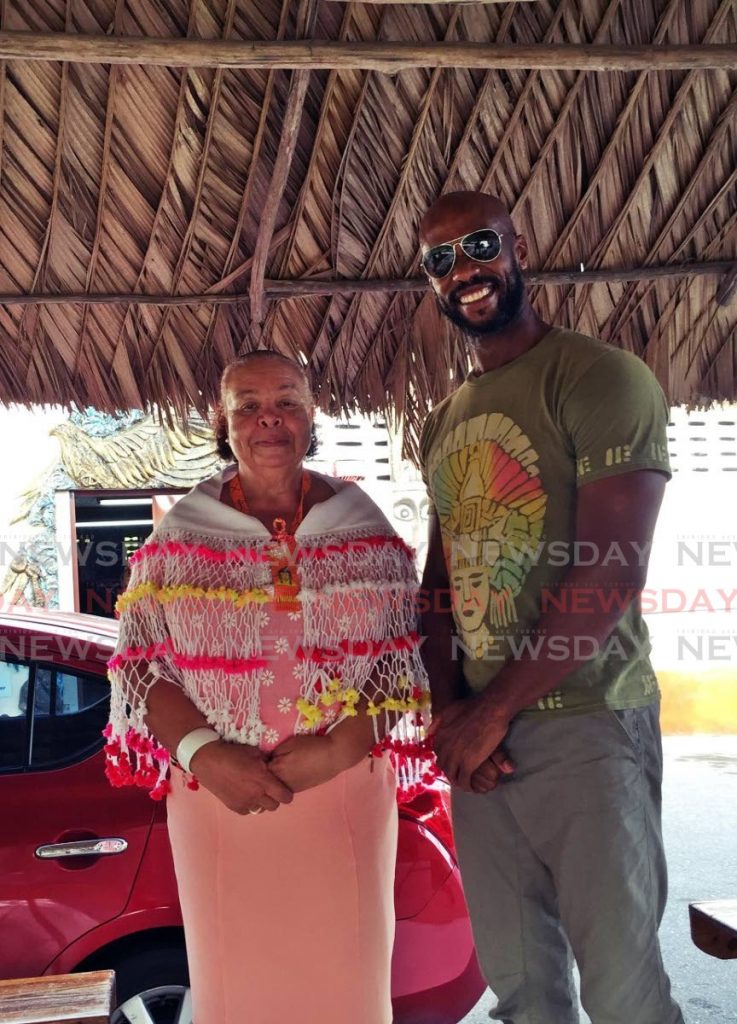Kambon 'corrects' chief of Santa Rosa First Peoples

ACTIVIST Shabaka Kambon says the chief of the Santa Rosa First Peoples Community (SRFPC) is doing indigenous people a disservice by opposing efforts to remove monuments of Christopher Columbus.
In a recent television interview, the chief, Ricardo Bharath-Hernandez, said removing such colonial-era statues "does not make sense – not for us at Santa Rosa and for right-thinking people." He criticised the movement and also appeared to dismiss contributions made by the Cross Rhodes Freedom Project (CRFP), of which Kambon is a director.
In response, Kambon, an honorary member of the Warao Nation s,aid he was seeking to clear the air on the relationship between his foundation, the SRFPC and the #ColumbusMustFall campaign.
"The CRFP can no longer allow Bharath to purposely mislead the nation about what has transpired or to pretend that indigenous people do not have a stake in the unfolding global revolt against white supremacy and its racist iconography, especially now that they are actively tearing these monuments down," said Kambon.
He said a month before Cross Rhodes was established in 2017, he and the foundation's co-director Claudius Fergus met with Bharath, then SRFPC Queen Jennifer Cassar and other elders of the community.
"Plans for the national campaign were discussed," Kambon said, "including those for a monument to celebrate 300 years of indigenous resistance instead of Columbus, the architect of native genocide."
Kambon said the SRFPC queen, speaking on the majority of elders, announced she was "300 per cent behind the project," while Bharath-Hernandez was opposed.
"Despite being the lone dissenting voice on the day, Bharath agreed to represent the community at CRFP’s national launch at NALIS (the National Library) on June 21 (2017), participating in a smoke ceremony with Warao elders to symbolically exorcise the spirit of Columbus from the square and make it ready to honour indigenous ancestors.
"Over the next year the CRFP would be engrossed in a successful campaign to remove the name of another colonial criminal, Alfred Milner, from a hall of residence at the UWI's St Augustine campus."
However, Kambon said the CRFP's attention returned to the #ColumbusMustFall campaign, around the time Cassar died in July 2018.
"In the wake of her passing Bharath became more strident in his criticism of the project, trivialising everything with his now infamous jibe that we would not have clothes to wear if it weren’t for Columbus. Shockingly he repeated this on October 12, 2018, at the 526th commemoration of Columbus’ invasion and brutal occupation of the Caribbean in front of representatives of indigenous peoples from across the region prompting a heated and embarrassing pubic exchange" (with Kambon and queen of the Warao Nation Donna Bermudez-Bovell).
The following month, Kambon said, a meeting was organised to include the chair of the National Reparations Committe, Aiyegoro Ome, to explore ways to link the campaign to reparations for indigenous peoples.
"By this time the CRFP had developed a more comprehensive set of proposals to support indigenous development through collaboration with other indigenous groups. Paramount among these was a joint programme of action to end the false and demeaning misrepresentation of indigenous people in the now debunked Columbus hero myth still taught in the nation’s primary and secondary schools."
"Chief Bharath-Hernandez endorsed the ideas, acknowledged that Columbus’ crimes were indefensible and even agreed not to push back against the removal of the statue butsaid, he would not collaborate with the CRFP unless there were clear, tangible benefits for SRFPC, backed by firm commitments from the government."
Kambon said, "Chief Bharath was so intoxicated by 'tangible benefits' that he failed to discern the intangible benefits represented by the CRFP's proposals such as respect, recognition and restoration of historical memory and has subsequently gone on to repeat arguments developed in the US to protect racist monuments to the confederacy."
The movement to remove colonial monuments has gained traction in recent weeks, particularly following the death of George Floyd in Minnesota. Floyd is one of the latest victims of what is widely considered to be police brutality and by extension, systematic racism in the US.
Initiated by the Black Lives Matter movement, Floyd's death sparked anti-racism and anti-police brutality demonstrations around the globe, even in countries with a vast history of colonialism, including the UK, Spain and Belgium.
Statues of racists and colonialists are being removed officially and unofficially worldwide. Last week, international media reported that Oxford University's Oriel College would remove the statue of the imperialist Cecil Rhodes, from whom the CRFP took its name.

Comments
"Kambon ‘corrects’ chief of Santa Rosa First Peoples"